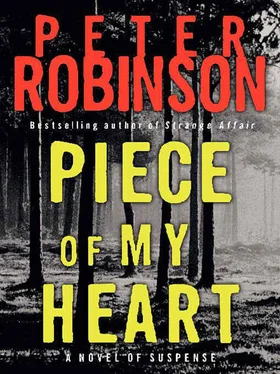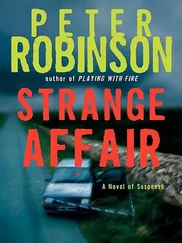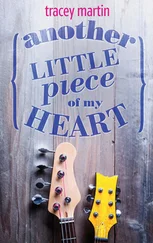“Did you go there again, after the raid?”
“Yes. The next day. Steve didn’t want to know me. None of them did. He spread the word that I was a copper’s daughter, and I was ostracized by the lot of them.” She snorted. “Nobody wants to share a joint with a copper’s daughter.”
“What did you do?”
“I was really hurt. I ran away from home. Took all the money I could and went to London. I had one address there, Lizzie, a girl who’d stayed at Springfield Mount once. She was nice and let me sleep in a sleeping bag on her floor. But it wasn’t very clean. There were mice, and they kept trying to get into the sleeping bag, so I had to hold it tight around my neck, and I couldn’t really get any sleep.” She gave a little shiver. “And there were even more weird people about than there had been in Leeds. I was very depressed, and I started to get frightened of my own shadow. I think Lizzie got really fed up with me. She talked about negative energy and stuff like that. I was feeling lost, then, really out of place, like I didn’t belong anywhere and nobody loved me. Typical adolescent angst, I can see now, but at the time…”
“So what did you do?”
“I went back home.” She gave a harsh laugh. “Two weeks. That was the sum of my life’s big adventure.”
“And how did your parents react?”
“Relief. And anger. I hadn’t rung them, you see. That was cruel of me. If my daughter did that, I’d be beside myself, but that’s how selfish and how upset I was. My father, being a policeman, always thought the worst. He had visions of me lying dead somewhere. He even told me that at first he thought something had happened to me, and that maybe it had something to do with McGarrity or the others taking revenge on me for shopping them. But he couldn’t do anything official because he didn’t want people to know. It must have torn him apart. He took his duty as a policeman so seriously.”
“Didn’t want people to know what?”
“About me and those hippies.”
“What was your father like during the investigation and trial?”
“He was working very hard, very long hours. I remember that. And he was very tense, tightly wound. He started getting chest pains, I remember, but it was a long time before he would go to the doctor. We didn’t talk much. He was under a lot of strain. I think he was doing it for me. He thought he’d lost me, and he was taking it out on McGarrity and everyone else involved. It wasn’t a comfortable time in the house, not for any of us.”
“But better than mice in the sleeping bag?” Annie said.
Yvonne smiled. “Yes, better than that. But we were all glad when it was over and McGarrity was convicted. It seemed to take forever, like a big black cloud over our heads. I don’t think the trial started until the following April, then it went on for about four weeks. Things were pretty tense. Anyway, in the meantime I went back to school, got on with my A levels, then I went to university in Hull. This would be the early seventies. There were still a lot of longhairs about, but I kept my distance. I’d learned my lesson. I applied myself to my studies, and in the end I became a schoolteacher and married a university professor. He teaches here, at Durham. We have two children, a boy and a girl, both married now. And that’s the story of my life.”
“Did you ever hear your father express any doubts about McGarrity’s guilt?” Banks asked.
“No. Not that I can remember. It’s as if he was on a crusade. I can’t imagine what he would have done if McGarrity had got off. It doesn’t bear thinking about. As it was, the whole thing ruined his health.”
“And your mother?”
“Mum stood by him. She was a brick. She was devastated when he died, of course. We both were. But eventually she remarried and lived quite happily. She died in 1999. We were close right until the end. She only lived a short drive away, and she loved her grandchildren.”
“That’s nice,” said Annie. “We’ve nearly finished now. The only other thing we want to ask you about is the death of Robin Merchant.”
“The Hatters’ bass player! God, I was absolutely gutted. Robin was so cool. They were one of my favorite bands, back when I used to listen to pop music, and we’d sort of claimed them as our own, too. You know they were from Leeds?”
“Yes,” said Annie.
“Anyway, what about him?”
“Did your father say anything about it?”
“I don’t think so. Why would he…? Oh, yes. My God, this is taking me back. He talked to them during the McGarrity thing, and he got me an LP signed by all of them. I think I’ve still got it somewhere.”
“Must be worth a bob or two now,” said Banks.
“Oh, I’d never sell it.”
“Still… did he say anything?”
“About Robin Merchant? No. Well, it was nothing to do with him, was it? That was the next summer, after McGarrity had been sent to jail, and my dad’s heart was starting to show the strain even more. We never really talked about those sorts of things – you know, the music and hippie stuff – not after I came back from London. I mean, I was done with that scene, and my dad was grateful for that, so he didn’t go on at me about it anymore. Mostly I threw myself into my A levels.”
“Does this mean anything to you?” Banks brought out a photocopy of the ringed numbers from the back page of Nick Barber’s book.
Yvonne frowned at it. “I’m afraid not,” she said. “I didn’t say I was a maths teacher.”
“We think it might be dates,” Banks explained, “most likely dates connected with the Mad Hatters tour schedule or something similar. But we’ve no idea which months or years.”
“Leaves it pretty wide open, doesn’t it, then?”
Annie looked at Banks and shrugged. “Well, that,” Banks said, “is just about it, unless DI Cabbot has any more questions for you.”
“No,” said Annie, standing and leaning forward to shake Yvonne’s hand. “Thanks for your time.”
“You’re welcome. I’m only sorry I couldn’t be any more help.”
“What do you think about what Yvonne told us?” Annie asked Banks over an after-work drink with cheese-and-pickle sandwiches in the Queen’s Arms. The bar was half empty and the pool table, happily, not in use. A couple of late-season tourists sat at the next table poring over Ordnance Survey maps and speaking German.
“I think what she said should make us perhaps just a little more suspicious of Stanley Chadwick and his motives,” said Banks.
“Chadwick? What do you mean?”
“If he really thought his daughter had been terrorized and threatened with rape, and he was on a personal crusade… who knows what he might have done? I try to imagine how I would behave if anything like that ever happened to Tracy and, I tell you, I can really frighten myself. Yvonne told us that McGarrity talked about the dead girl to her, about Linda Lofthouse. Admittedly, she didn’t say he’d given her any information only the killer could have known, but we both know that sort of thing mostly just happens on TV. But what he did say sounded damn suspicious to me. Imagine how it sounded to her father, at his wits’ end trying to catch a killer and worried about his daughter hanging around with hippies. Then he finds out this weirdo who terrorized her had a flick-knife and was seen wandering around with it at Brimleigh Festival. Imagine he puts the two together, and suddenly the light goes on. Yvonne told us he didn’t really look at anyone else for the crime after that. Rick Hayes went right out of the picture. It was McGarrity all the way, and only McGarrity.”
“But the evidence says McGarrity did it.”
“No, it doesn’t. Everyone knew that McGarrity carried a flick-knife with a tortoiseshell handle, including Stanley Chadwick. It wouldn’t have been that hard for him to get hold of one just like it. Don’t forget, Yvonne says she didn’t see the knife when McGarrity terrorized her.”
Читать дальше












